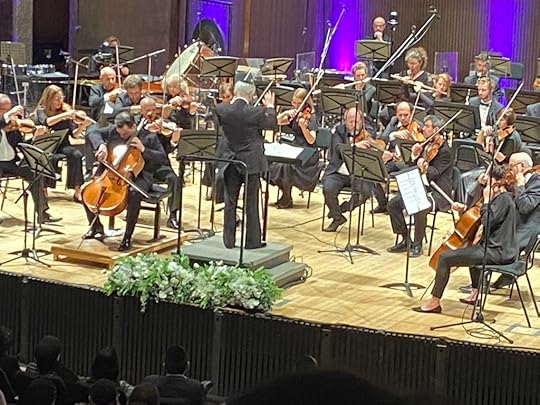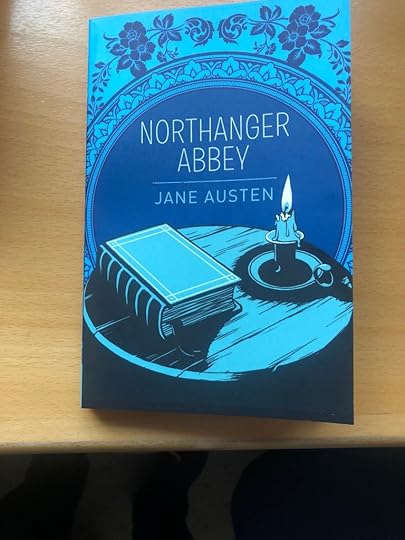Dorothea Shefer-Vanson's Blog, page 12
April 26, 2023
The Twelve Tribes

It was with a mixture of anticipation and apprehension that we bought tickets for the concert of the Jerusalem Symphony Orchestra in which the first half consisted of the performance of an unknown work entitled ‘Twelve Tribes’ by an unfamiliar composer, Benjamin Yusupov. The attraction of the second half of the concert lay in the performance of Dvorak’s much-loved cello concerto, and that was why we took a chance on that occasion.
On entering the Henry Crown auditorium in the Jerusalem Theatre complex we were taken aback by the massive orchestra assembled on the stage. This was obviously going to be something extraordinary. The conductor, a small man of middle age with a head of white hair topped by a small black kippa (skull cap), took his place at the podium then turned to the audience and began to explain the rationale behind the piece we were about to hear. Turns out that he was also the composer, and felt impelled to give us some insights into the music which, he informed us, would take about an hour to perform.
In clear, simple Hebrew he explained that he had felt the need to keep a record of the musical traditions of the different ethnic groups comprising the Jewish people in the various regions of the world, but primarily those of communities from Asian countries and those which had been incorporated into the former Soviet Union, since those traditions were beginning to fade from memory. Thus, the segments making up the various movements consisted of passages evoking the musical traditions of the Jewish communities of Tajikistan (Yusupov’s birthplace), Georgia, Morocco, Tunisia, Yemen, Iran and others as well as an evocation of Klezmer music from eastern Europe.
The various pieces required tremendous virtuosity from the orchestra, with rhythmic shifts and the use of a variety of unusual instruments, with particular emphasis on the brass and the tympani. The full range of the orchestra was used to maximum effect, creating a kind of ‘surround sound’ which enveloped the audience in a musical experience that was both captivating and intriguing. Yes, there was a lot of noise coming from the orchestra, but at no point was it the cacaphonic disharmony that characterizes many modern musical offerings. Somehow all the different musical traditions blended together harmoniously.
Yusupov himself is an impressive musician – pianist, conductor and composer – who has won many international prizes for his work, and has been resident in Israel since 1990. Here, too, he has won prizes and made a name for himself, working in tandem with many prominent artists and ensembles, as well as continuing to compose at breakneck speed. As he explained, the idea of assembling the music of the various Jewish communities into one orchestral piece served to symbolize both the ingathering of the exiles and the unity that life in Israel represents.
It cannot be denied that at times like today, when discord and disagreement prevail in Israel, it is encouraging to be able to turn to music to give us consolation and hope for the future.
April 18, 2023
Died, Disappeared, Perished

Something that never ceases to amaze (and annoy) me is the extent to which various euphemisms are used to describe what happened in the Holocaust to six million Jews. Why is everyone – whether individuals, politicians or scholars – so reluctant to use the correct term: murder?
For that is what happened to my grandparents, your aunts and uncles, other people’s parents, children, brothers and sisters, cousins, neighbours and friends. They were all murdered in the most dastardly, cold-hearted, brutal and inhumane manner. That is all that can be said about that dreadful time in human history, and Jewish history in particular, that took place in Europe not so very long ago. None of those people simply died, disappeared or perished of their own account. They were murdered, and the people who perpetrated those crimes were murderers.
How did it happen that Germany, a country noted for its achievements in the fields of culture, philosophy, music and art, managed to descend to a level of bestiality unseen since civilization began? How could human beings, people who had homes, mothers, fathers, brothers and sisters of their own, wreak the most dreadful horrors on individuals who simply adhered to a different religion than theirs or, in the terms devised by their leaders, belonged to a different race than theirs? Simply by labelling them as inferior did not necessarily have to mean that they merited being killed outright, mercilessly, willy nilly, by hook or by crook, and that this had to be applied to every last one of them – men, women, children and babes-in-arms.
Somehow, by managing to persuade the nation that those others were less than human, human beings were able to erase every spark of humanity in themselves and brutally murder other human beings. The Jews did not represent a physical threat to the German nation, and had even contributed to progress in the sciences and the arts. The wild imaginings of unbalanced leaders who had managed to gain the confidence of the German nation led to the riot of hatred and violence that culminated in the construction of extermination camps, factories of death, operating with unflinching efficiency to murder six million Jews (as well as various others) on production lines which first eked out labour from whoever could still be of some use to the German munitions industry.
And let’s not forget on this Day of Remembrance of the Holocaust that it was not the Germans alone who wallowed in the orgy of death and destruction. Their henchman in other European countries helped to round up the Jews, keep the ghettos and camps guarded, the railway tracks oiled, the cattle-trucks filled, and the spoils of war gathered. And although there were a few decent people who helped to hide and save a handful of Jews, they were, after all, few and far between.
As we sat at the Seder table just a week or two ago we read in the Haggada how throughout our history other nations have sought to destroy the Jewish people. This has been a recurring theme ever since Biblical times, whether we were living in our own land or as a barely-tolerated minority in other countries. Today, when we finally have a country of our own once more, we must not lose sight of the need to remain strong in order to survive. But neither can we allow ourselves to lose sight of our humanity in the process.
April 10, 2023
Difficult Times

This year’s Passover festival began under the cloud that has enveloped Israel ever since the mass demonstrations protesting the so-called ‘legal reform’ began. Yet preparations for the festival went ahead in the customary fashion, with spring cleaning and food purchases and preparations much as usual. By a quirk of the calendar, this year Passover coincided with the Moslem festival of Ramadan. It’s less of a coincidence that it coincided with the Christian festival of Easter, as Jesus’s Last Supper, held just a few days before his crucifixion, was almost certainly the Passover Seder. The hard-boiled egg which Jews eat dipped in salt water at the Seder has been taken over by the Christians in the form of chocolate Easter eggs, which might not be such a bad idea.
As Passover coincides with spring and lasts seven days, many Israelis take the opportunity to travel, either inside Israel or abroad, and once the Seder is over families take to the road and make for the traditional picnic spots and recreational parks. It is a time when Israel’s countryside is at its best, still green from the winter rains, and its lakes and streams replete with water.
Because of Israel’s fragile security situation our enemies have chosen this time to strike both from within and from outside the country. Tensions were high on the Temple Mount as Moslems barricaded themselves into their sacred Al-Aksa mosque, accumulating rocks and stones which were intended to be used against Jews gathering for prayers in the Western Wall plaza. Rockets were fired into the country from Lebanon and Syria in the north and the Gaza Strip in the south, causing some material damage but no loss of life. Palestinian terrorists succeeded in gunning down a car carrying a mother and her two daughters, seriously injuring the mother and killing the girls. Another Palestinian drove his car at speed along a bike track into a group of tourists in Tel Aviv, killing one and injuring the others.
Scenes of violence abound on our television screens, and the sight of armed Palestinian militias marching through their towns is enough to turn anyone’s stomach. Attacks by Israeli Arabs on other Arabs within Israel proper (the Green Line) are endemic and indicate the extent to which weapons are widespread among the Arab population within Israel. Both inside Israel and in the West Bank there is no shortage of weapons and general readiness to use them, whether against their own people or the others, namely, us. In fact, on consideration, it’s a miracle that there isn’t more widespread use of deadly weapons among the general population.
While the current government is undoubtedly responsible for maintaining law and order on an ongoing basis, it has chosen to play the blame game and accuse the previous government of being the cause of the current developments. Regardless of the fact that during the brief period of the previous government’s term there were far fewer rocket attacks and terrorist violence, the current government refuses to accept responsibility for the situation.
And so we, the general populace, are left to contend on our own with a situation in which the government abdicates responsibility for events and leaves us to cope with the anger and sadness that envelops us.
March 31, 2023
Worrying Echoes

The echoes of events that happened in Germany just a few decades ago are continuing to disturb my peace of mind and give me sleepless nights.
We all know that Prime Minister Netanyahu’s position is precarious and that his main goal is to avoid having to stand trial for the various offences of which he is accused. The coalition government he cobbled together after the last general election by incorporating elements from the extremist right-wing and ultra-orthodox Judaism parties has created a situation in which those elements have him over a barrel at every twist and turn in the road. That is why the Minister for Public Security sees fit to seize every opportunity that comes his way to threaten to overthrow the government. That is why he has now made his assent to its continued existence contingent on the creation of a separate military force, under his sole control, in contrast to the country’s official police force, which has its own Chief of Police.
It’s no secret that the minister concerned is at loggerheads with the current Chief of Police over the treatment meted out by the police force to the demonstrators protesting aginst the government’s programme of judicial reform. The protestors claim that the reform will give the government virtually unrestricted control over the judiciary, obliterate all vestige of checks and balances between the agencies of government and put an end to the equal rights and rule of law delineated in Israel’s Declaration of Independence.
In claiming to have been given the mandate by the electorate, the Likud party assumes that this is tantamount to having been given the right to rip up the lawbook and destroy the consensus regarding equality and basic human rights that underlies Israel’s society and has constituted its basis since its establishment in 1948. In the framework of the State’s initial institutions – the People’s Council and the Provisional Council of State (selected debates of which have been translated and published under the auspices of the Jerusalem Center for Public Affairs) – the basic tenets of the Declaration of Independence were incorporated into law. Paragraph 13 of that declaration states unequivocally that Israel will ‘ensure complete equality of social and political rights for all its citizens, irrespective of creed, race or sex. It will guarantee freedom of religion, conscience, education and culture.’
One cannot help but wonder at the hutzpa of someone who spent his youth protesting actively against government policy, being indicted in several cases of terrorism and hate crimes, demanding to have a militia of his own. What would he use it for if not to further his own ends of spreading hatred and inciting terror? Against whom? The people who don’t agree with his policies, which is the majority of liberal-minded, law-abiding Israelis. Not to mention the Palestinians. As matters stand now, the hate crimes committed against Palestinians by settlers in the occupied territories generally go unpunished.
And what name would he give his militia? The Security Service (SS)? The Security Association (SA)? The whole idea of someone whose ideology is one of violence and oppression being given so much power is one that makes one’s stomach churn. The future of Israel’s society is at stake, and we cannot stand idly by and watch the country being torn to shreds simply in order to save the prime minister’s skin.
March 23, 2023
A Night at the Opera

Times are hard at the moment in Israel, with a sense of impending doom hanging over us as the politicians continue to pursue their objectives at all costs. So for a bit of light relief one goes to a production of Mozart’s marvellous opera Don Giovanni in the Tel Aviv home of the Israel Opera. You settle into your seat, nod politely to the person in the seat next to yours and glance at the programme, Before the opera begins the usual announcements about forthcoming performances and turning one’s cell phone off appear on the screen that fills the entire proscenium. The next opera will be something new, an opera based on the life of Theodore Herzl, the visionary who gave birth to the idea of a Jewish State. A colour portrait of a pensive Herzl appears on the screen, followed by this text (in Hebrew), taken from Israel’s Declaration of Independence, and based to a great extent on the text of his novel Altneuland describing the new state as he envisioned it.
From the Declaration of Independence in accordance with Herzl’s vision:
The State of Israel will be open to Jewish immigration and the ingathering of the exiles; it will work to develop the country for the benefit of all its residents; it will be founded on the basis of the aspiration for justice and peace as described by the Prophets; it will adhere to complete equality of social and political rights for all its citizens without any differences on the basis of religion, race or gender. It will guarantee freedom of religion, conscience, language, education and culture, and will maintain the places that are sacred to all religions. It will adhere to the principles of the declaration of the United Nations.
The audience breaks into spontaneous applause and cheering. It is a strange, almost other-worldly experience to find oneself together with another thousand or so respectable (and mainly elderly) citizens roaring approbation of an abstract text in Hebrew on a huge screen. So, it seems, even at the opera we can’t get away from the ever-present situation which clouds the reality in which we find ourselves living.
The text disappears and the orchestra plays the overture, with Mozart’s brilliant musical insights into the human psyche, crashing chords denoting the fate that awaits the eponymous villain, the scales in a minor key that manage to create a menacing atmosphere and all the usual tuneful twists and turns with which Mozart delights us. This atmosphere continues throughout the opera, with dramatic development, delightful arias sung by beautiful ladies in elegant dresses, and no lack of erotic innuendo – both in the music and in the acting in this particular production.
We are drawn to and yet disgusted by the antics of the randy, amoral ‘hero’ of the piece, who unashamedly pursues every woman who happens to cross his path, regardless of their situation, trampling rough-shod over their emotions. And yet, despite ourselves, we find Giovanni’s insouciant lack of scruples amusing, and are delighted by the snappy interaction between him and his reluctant servant Leporello. We watch in hypnotized fascination as the nefarious lothario finally gets his just desserts and is punished for having killed the outraged father of one of his conquests.
No one wishes a similar fate for any member of the current government, yet there are some disturbing resemblances between the behaviour of some of them and that of Don Giovanni.
March 16, 2023
Cooking with Jamie, Ainsley, et al.

To my surprise (and shame), in my old age I have become an aficionado of cookery programmes on television. Of course, I don’t go for just any old cookery programme, I have my standards, after all, and my particular penchant is for those hosted by cooks, or chefs, who originate from England (or Ireland, Scotland or Wales), i.e., who speak the English language in a way that brings back memories of my childhood and youth.
I refuse to have anything to do with cookery programmes presented by hirsute male chefs whose arms are tattoed so much that one cannot see any flesh underneath, or by women whose long, curly locks of indeterminate colour dominate the screen and doubtless contaminate the food they’re preparing. Nor will I waste my time watching cookery competitions, as the whole concept of cooking in order to meet a deadline or beat one’s competitors is alien to me.
Another programme that gets my goat (i.e., annoys me) involves a popular singer/actor accompanied by a well-known Israeli chef who is considered an expert on far-eastern cuisine, and certainly regards himself as such. The sense of smug superiority the latter exudes is a complete turn-off for me. And besides, I have no desire to spend my time watching other people eat, and especially when they talk with their mouth full. Yuk!
No, the programmes I like to watch involve an aesthetic production in which an individual of edifying appearance, e.g., Jamie Oliver or Mark Moriarty (Off-Duty Chef), demonstrates how to prepare and cook items of food that we viewers can reproduce and put on our own family table. I feel an emotion that is almost akin to affection for those young men who are prepared to put their heart and soul into showing us how to prepare a whole meal, whether it is in one pot (Jamie again) or reminds us of our youth (Ainsley). And of course, I have tremendous respect for Mary Berry, who speaks the Queen’s (now King’s) English with an impeccable accent, looks delightful despite her advanced years, and makes preparing tasty dishes look easy and elegant. How I enjoy watching Jamie charm his way across Italy, getting recipes from nonnas (grandmothers), speaking Italian and then relaying the information to us.
Since I tend to watch those programmes when I’m getting ready for bed, or taking my post-prandial afternoon nap, I’ve begun keeping a notepad and pen next to my bed in readiness to take down any recipe that looks simple enough for me to attempt for my next cookery excursion. Of course, it also depends on having the right ingredients, and in my kitchen those are usually missing. By now, however, I have gained a few staples that would have made my late mother raise her eyebrows (teriyaki sauce, red wine vinegar, to name but a few).
The personality of the presented certainly plays a part in getting me to watch. I enjoy Jamie’s youthful enthusiasm and knowledgeableness about health aspects of the various foods, Ainsley’s almost Cockney-like Caribbean cheekiness, Mary Berry’s graceful dignity, and Mark Moriarty’s red-haired Irish charm.
Furthermore, recently I’ve been able to enjoy the new HBO series about that pioneer of American TV cookery programmes, Julia Childe, with a wonderful portrayal by Sarah Lancashire of her unique character and charm. The programme also gives us insights into the process of producing that kind of programme as well as into the private life of Julia Childe herself. A true delight for the eye and ear, as well as (almost) for the taste-buds.
March 9, 2023
‘Jane Austen’s Northanger Abbey’

When I was at high school and was required to read books by Jane Austen I did my best to find them interesting but failed dismally. The characters and situations she describes in her novels are very far removed from any situation I had ever experienced, and the idea that a young woman’s sole purpose in life was to find a wealthy husband seemed too feeble to be considered a suitable reason for existing. I was too involved in the ups and downs of my own twentieth century life to appreciate the limitations and concerns that overshadowed the way women lived in the eighteenth century, and I failed to perceive Austen’s perceptive analysis of human behaviour, and the manners and mores of her time.
So it was with suspicious curiosity that I embarked on reading one of Jane Austen’s later novels, one I had not been required to read while at school, ‘Northanger Abbey.’ The first half of the book describes in great detail the experiences of a young woman being entertained in the fashionable town of Bath, where life consisted of balls and social occasions of various kinds. The heroine of the book, Catherine Morland, is described as an innocent young woman who is eager to enjoy all the delights of fashionable society, while at the same time being unduly influenced by the lurid novels she reads. In fact, what Austen is doing here is poking fun at other – mainly female – writers, like herself, and especially at the tendency of young readers to let their imagination run away with them.
Thus, while staying with newly-acquired friends at their home, the Northanger Abbey of the title, Catherine imagines that all kinds of strange and wonderful events have taken place there, and even comes to the conclusion that the father of her friends has locked his wife up, or even murdered her – shades of Charlotte Bronte’s novel, ‘Jane Eyre’ (which was published several years later). On one level, the book is a homily on the way young women’s minds could be manipulated by novel-writers, and on another it is a parody of that self-same kind of book.
Naturally, as in every self-respecting novel, there must be the aspiration for love as well as disappointment in that sphere, in addition to entertaining encounters between clever young men and innocent young women, where in some cases the former poke fun at the latter, or in others seek clumsily and unsuccessfully to curry favour with them. Financial prosperity also plays a part in the way the characters relate to one another, and it is only at the very conclusion of the book, after innumerable ins and outs as well as ups and downs, and even a heart-stopping contretemps just before the end, that all ends well.
Setting aside the narrative style that Jane Austen adopts, which is inevitably coloured by the narrative conventions and speech patterns of the time as well as her own inimitable turn of phrase which even involves direct interaction with the reader, one cannot avoid admiring her ability to create credible characters, each with their own way of speaking, thinking and acting. It is not for nothing that her books, though limited to a time and society that is long gone, have endured for so many years, and today are considered classics of the genre.
March 2, 2023
Nil Desperandum

Since my childhood in London I have enjoyed being able to read a newspaper that is delivered to my house every morning. In England this was pushed through our letterbox and appeared on our carpeted hallway floor. In Israel it is thrown onto our driveway from the car driven down the road by the delivery person. If I happen to be outside at the precise moment that she passes she puts it into my outstretched hand and we wish one another good morning, but on most days I’m still inside when her car goes by, and I go out to retrieve the paper from the driveway entrance a little while later.
Till recently, being able to sit down in the quiet of the early morning with a cup of coffee, a biscuit and the daily newspaper has always been a moment of leisurely pleasure for me. But at the moment that pleasure is diminished somewhat by the content which I find myself reading. We have been through difficult times in the past in Israel, with terror attacks, political unrest and even wars, and we have come through them all more or less in one piece, but these days the news items, the opinion pieces and even the letters to the editor fill me with dismay. There have been disagreements between various segments of the population in the past, but what has been happening in Israel and in the West Bank recently has gone beyond the concept of simple disagreement. A rift has opened up within Israel, and the tenor of the disagreement has taken a fresh turn, seeming to become an irreconcilable breakdown.
Essentially, what is now accepted as Israel within the pre-1967 borders is a democracy whose legislative basis is currently being undermined by political elements who reject the basic tenets of a democratic system, with the supremacy of the rule of law and the acceptance of the principle of government under a system of checks and balances.
And it is just those political elements who for the past fifty years have been involved in establishing settlements throughout the West Bank, imposing their views on the wider Israeli society, and involving Israel’s military might to maintain their supremacy there. Any Israeli under fifty has never known any other reality in Israel, but I and others like me remember that Israel was once a tight-knit society that was united in its sense of purpose. I remember the events leading up to the Six Day War and the existential threat represented by the Arab countries on our borders, with most of whom we have since made peace. I also remember the way in which the first settlers sought to impose their will on a reluctant government, eventually prevailing (Sebastia and others that followed), setting in motion a series of events that have brought us to the current situation in which resentful Palestinians kill Jews whenever and wherever they can and Jews retaliate, either by means of the official channels of the IDF or through marauding gangs of settlers who destroy Palestinians’ property and persons indiscriminately.
We have reached a sorry state of affairs and there seems to be no solution in sight to heal the rift within Israeli society. The perverted self-righteous indignation disseminated by Netanyahu serves only to exacerbate the situation. I wish that I could soothe my nerves by no longer reading the newspaper or listening to the news, but I refuse to take the ostrich approach.
My one consolation is the knowledge that my children and grandchildren are well, and that Israel’s intellectual and cultural institutions are still functioning. But there’s no guarantee that this situation will persist indefinitely given the current climate of repression and antagonism.
February 23, 2023
La Rafle des Notables

(The Deportation of Prominent Jews)
by
Anne Sinclair
(French. published by Bernard Grasset, Paris 2017)
Anne Sinclair, noted French writer and journalist, has written extensively about the Holocaust and how it affected her family. In this book she focuses on the arrest and deportation to a prisoner camp at Compiègne of her maternal grandfather, Leonce Schwartz. He and his wife, Marguerite (Margot), resided in a comfortable apartment in a pleasant part of Paris. He owned a workshop producing lace, and their life was conducted along the lines of respectable residents of Paris, with bridge games, visits to the theatre, and a social life with friends and family.
Anne Sinclair confesses to having failed in her childhood to ask her grandparents about their experiences during the war, when Germany occupied France and persecuted Jews. In this they were aided by the French authorities, first in the area of the country under the Vichy regime, and later throughout France. To her chagrin, she did not find any record written by her grandfather of what he went through, but rests her account of what happened to him from versions written by others who underwent the same experience as well as the historical research of Serge and Beate Klarsfeld, renowned scholars of that dismal period.
First, she describes her visit to the actual site of the prison, Compiègne, which is now a military barracks, but found very little there regarding what her grandfather went through. She knew that the ‘rafle’ or roundup of reputable citizens of the Jewish faith, the ‘notables’ of the book’s title, took place on 12 December 1941, and that 743 Jewish men who were long-term residents of France and well-established within French society were arrested. They were taken from their homes at dawn that day and brought to the station to await the train taking them to the camp. Each arrest was effected by two French policemen accompanied by two Wehrmacht soldiers, and each man was allowed to take a small suitcase with a few basic articles. To their number were added another five hundred Jewish men who were arrested in the streets of Paris, with nothing but the clothes they happened to be wearing. This brought to one thousand the number of Jews arrested that day, in line with Hitler’s plan to ‘rid Europe of its Jews.’
In icy cold weather the men, most of them no longer young (Leonce was 63), were made to stand and wait for many hours without food or water until they were forced into the train taking them to Compiègne, which fortunately was not a cattle train and had seats. Anne Sinclair names the prisoners who managed eventually to write a record of what they endured, and it is on these that her account of what her grandfather must have endured is based. Like many well-established and assimilated Jews, Leonce and Marguerite had remained in their home despite growing anti-Semitic propaganda and laws introducing the forced registration and restricted movement of Jews.
Late at night the train reached Compiègne, a few miles from Paris, where the prisoners were beaten and force-marched to the camp which consisted of a few brick walls and bare earth on which the exhausted prisoners had no option but to lie. There were three separate camps there, one for French political prisoners, one for Russian prisoners of war, and one for Jews – which was where Leonce was. The conditions in the Jewissh camp were worse than those in the others, with no possibility of receiving letters or packages, terrible sanitary conditions, and starvation rations. Occasionally, the prisoners in the other camps would share some of their food with the Jewish prisoners, and eventually iron bedsteads with thin mattresses were provided for the Jewish prisoners. The glass in the windows was broken, letting in the cold winter air; the walls topped by barbed wire provided precious little shelter from the elements. As was the case in all concentation camps, prisoners had to stand for hours during roll-call and endure the beatings and insults of the guards. The filth and lack of hygiene in the camp led to outbreaks of disease and infestations of vermin, lice and fleas. Some of the detainees were medical doctors and did what they could to ease the pain and distress of the others, but without medicines or food there was little they could do. A handful of prisoners considered to be gravely ill were released or hospitalised.
With the passage of time the prisoners’ physical state deteriorated, they lost weight and their physical and mental condition brought many of them to the verge of insanity. Some of them were deported to the main French holding camp at Drancy and thence to Auschwitz, Many of those arrested with Leonce were distinguished intellectuals, members of leading French families, and men who had fought for France in WWI; the camp at Compiègne was termed by one of its inmates, Jean-Jacques Bernard, ‘the camp of slow death.’
For a long time Leonce’s wife Marguerite had no news of what had happened to her husband or where he had been taken, as she tried desperately to trace his whereabouts. She eventually found out where he was and joined others making their way to Compiègne. Anne Sinclair imagines her grandfather trying to maintain some kind of cleanliness and self-respect despite the dire conditions in which he was forced to live. Prisoners played bridge or gave lectures on subjects regarding which they were knowledgeable, and this helped to maintain some kind of morale. Many, especially doctors, tried to help and support one another to the best of their ability, even though the treatment they received at the hands of the Nazis sought to reduce them to the level of beasts.
Leonce was imprisoned at Compiègne for three months, and was freed by being sent to hospital because he was considered to be very ill – as was the case with several other inmates after the long months of starvation and abuse. The camp at Compiègne was later disbanded, and many prisoners were sent to Drancy and Auschwitz in accordance with the Nazi plan to exterminate the Jews of Europe, as agreed at the meeting of senior Nazis at Wannsee in March 1942.
Wearing the uniform of a nurse, Marguerite found Leonce in the hospital and managed to commandeer an ambulance and take him to Paris. Anne Sinclair is not in possession of the exact facts of his escape, but surmises that this is what happened, and that subsequently Leonce and Marguerite managed to remain hidden in France till the end of the war. Leonce died at his home in Paris on 16 May 1945, eight days after the armistice, having lived to be reunited with his son, Anne Sinclair’s father, who had been on missions in the Near East on behalf of the Free French forces during the war.
Reading this book takes the reader on a harrowing journey to a time and place which it seems impossible to believe occurred. One would like to think that such inhumane treatment of one human being by another could not have existed in what was one of the most civilised countries of the world, but it did, and we must be grateful to Anne Sinclair for putting the raw facts before us so graphically. We must never forget.
[image error]February 15, 2023
The Time Has Come

Now that the review, revision, even reversion, of basic principles in the judiciary has come to the fore of Israel’s political life it would seem to be appropriate to extend the approach to other spheres which till now have held sway and been considered sacrosanct.
The time has come to tackle another set of precepts that has irked policy-makers, and politicians in particular, in recent times. I’m talking about the Ten Commandments, those basic principles which form the bedrock of civilized human society but whose initial attraction seems to have worn off. After all, it’s all well and good in this day and age to obey the commandment to have no other gods or not to make idols. It’s easy enough to understand that those were necessary and valid precepts back then in those far-off times when ancient societies did indeed hold all kinds of strange beliefs about the deities they worshipped, whether in the physical form of effigies or in some inanimate form that varied from time to time.
And who can fail to appreciate the value of having a day of rest, the precept that preceded all labour laws everywhere and which has been adopted – and even extended – all over the world? Who can resist the attraction presented by the long, lazy, two-day weekend of most western societies? Even in Israel, which supposedly adheres to the concept of keeping one day of rest, has allowed the idea of a two-day weekend, or at least a one-and-a-half-day weekend, to impinge on its strict adherence to a single day of rest by giving workers Friday off. After all, having a day of complete rest requires a lot of preparation, so orthodox Jewish women have to pack two days of cooking, baking and housework into one day, while their husbands go off to fish, swim or relax in their local ‘parliament’ with the other husbands. Not to mention the ultra-orthodox in Israel, who don’t work on any day of the week, so that for them to focus on a single day of rest is rather problematic.
Honouring one’s father and mother is something of a tall order in this day and age when parents belong to a generation that is unable to keep up with the heady pace of technical developments. If honouring them means downloading new apps into their mobile phones while muttering something about their inability to understand progress, then that will have to suffice. I’m not sure that all our politicians are even as up-to-date as that, but thankfully they all have secretaries and/or personal assistants to do the donkey work involved in writing emails, Facebook posts and Twitter messages.
But now we come to the tricky part. Not stealing and not bearing false witness, i.e., lying. How can any self-respecting politician hope to get ahead while adhering to those outdated commandments? I suppose their thinking goes along lines of ‘being economical with the truth isn’t exactly lying. Everyone does it. It’s become the norm.’ So, essentially, one can delude oneself, and seek to delude others, by claiming that that particular commandment has outlived its usefulness.
And so we find ourselves facing a situation in which the people who decide our laws and now even control our judiciary – overturning the whole concept of checks and balances – are able to disregard the basic principles of decency with impunity.
One can only hope that the change in our government that is so sorely needed will come sooner rather than later, whether as divine retribution, disintegration from within, or punishment by the electorate.



